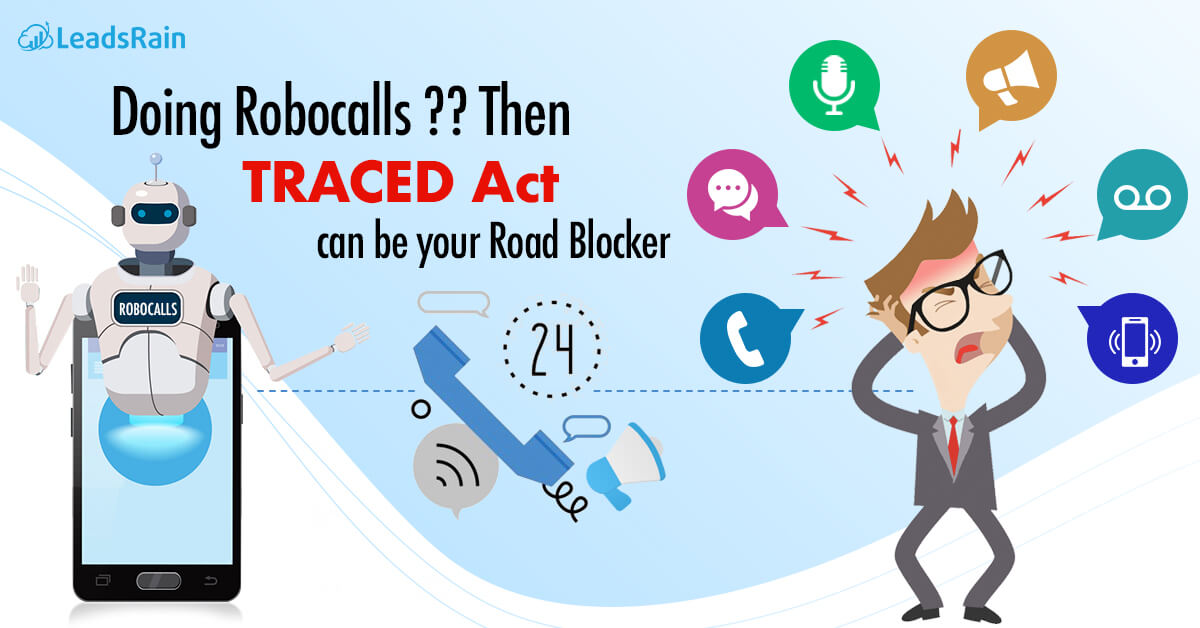In December of 2019, the US Congress passed the Traced Act, which empowers the FCC (Federal Communications Commission) to take strong regulatory actions against illegal robocalls. This has not come as a shock to many, since the talks have been underway for a while for such a law to come in place, keeping in mind the staggering number of robocalls that were made only in the last year. The Pallone-Thune Traced Act becomes the first-ever federal law that is prepared against undesired robocalls.
There are several pointers that need to be remembered before the lead generation campaign on the telecommunication platform. These pointers apply both, to calls as well as text messages.
- As the number of scams rises, the FCC has been given more authority through this act to chase down any scammer who is seen breaking the law even once. Moreover, the FCC is not required to issue a citation to the callers anymore.
- Another grave clause that the callers must remember is that through this Act, the FCC is in position to address violations that occurred up to 4 years ago.
- The service providers also need to offer technology for call authentication, free of charge to the customers. This technology must be provided within 18 months, and the FCC will be verifying the effectiveness of the technology every 3 years.
- Often, the robocalls made are intended for the previous owner of that number, which is why the FCC is working on providing the reassigned number into the database.
- The Traced Act does not clarify the definition of Automated Telephone Dialing Systems (ATDS).
Here are how the laws regarding consent stand among the various telemarketing formats:
| Cell Phone | Landline | |||
|---|---|---|---|---|
| Telemarketing | Not Telemarketing | Telemarketing | Not Telemarketing | |
| Auto Dialer (voice call) |
Prior Express Written Consent | Prior Express Content | No Consent Needed | No Consent Needed |
| Auto Dialer (Text Message) |
Prior Express Written Consent | Prior Express Content | No Consent Needed | No Consent Needed |
| Pre-recorded Message Call | Prior Express Written Consent | Prior Express Content | Prior Express Written Consent | No Consent Needed |
| Live Operator (No Auto Dialer) |
No Consent Needed | No Consent Needed | No Consent Needed | No Consent Needed |
The 15-section Traced Act becomes just another piece in the stringent telemarketing laws in the US. Many steps have been taken in recent years by the FCC to curb illegal robocalling. Recent examples from cases like the ACA International v. FCC and the Johnson v. Yahoo case looked to redefine or reinterpret the meaning of ATDS. This was perhaps why the FCC worked on tightening the gap in understanding these terminologies. With that said, it is certain to say that a law like the Traced Act has been in the works for quite a while now. But however stringent the laws may be, there the country is equally in need of it.
For instance, the 14th section points to the protection of hospitals from Robocalls. It states that within 180 days of its enactment, the FCC must formulate “an advisory committee to be known as the ‘Hospital Robocall Protection Group” having members from across various verticals such as hospitals, service providers to hospitals, companies mitigating robocalls, government officials and so on. The group will work on ideas to protect hospitals and other institutions from illegal robocalls.
Adding to that, a staggering revelation came up during the legislative debate where Congress put out a white paper with data on the extent of the robocall problem: In 2018, there were an estimated 48 billion robocalls, up over 64 percent since 2016, according to YouMail.
Meanwhile, First Orion predicts that this year 44.6 percent of all calls to mobile phones will be scam calls.
Why you shouldn’t worry about the Pallone-Thune Traced Act
In the wake of such laws coming being passed, one may think that there is little room to execute a truly compliant campaign through telemarketing formats such as auto-dialer or text messages. We have gathered some means that may allow one to formulate an entirely moral, and compliant campaign. Here is what needs to be followed:
- As an advertiser, one needs to be honest and not misleading. It is important to understand what could make an advertising campaign, deceptive in the eyes of potential customers. If your communication is clear, from the product or service being advertised, and the intent behind the advertisement is right, then the campaign will face no compliance issues.
- It is quintessential to have a clear understanding of the regulatory laws when communicating with customers or leads. Various central and state laws govern the way these telemarketing services can be used and it is important to remain within the bracket of these laws. Complying with the TSR and the state DNCs is of the absolute essence.
- There are also vertical-specific laws that relate to businesses and industries differently. It is important to identify the laws that govern campaigns for your specific vertical.
- Knowing your lead sources is the best way to protect your brand. Develop a due diligence and monitoring program tailored to the activity and risks associated with the campaign, including vendors and customers.
- Remain careful during upsells, cross-sells, and advance consent.
- As a brand, protecting private information is very important, since the lack of it can raise many questions from the customers as well as the state and central regulatory bodies.
Following these laws will not only safeguard your campaign but also maintain satisfaction among your leads toward your brand.
Although the TRACED Act has raised many questions, it has also solved many problems for this marketing and lead generation medium. Such laws hope to maintain and uplift the industries to maintain campaigns in accordance with the public requisites. This will nothing but help the telemarketing medium grow in use and capture a larger share among other marketing technologies.





